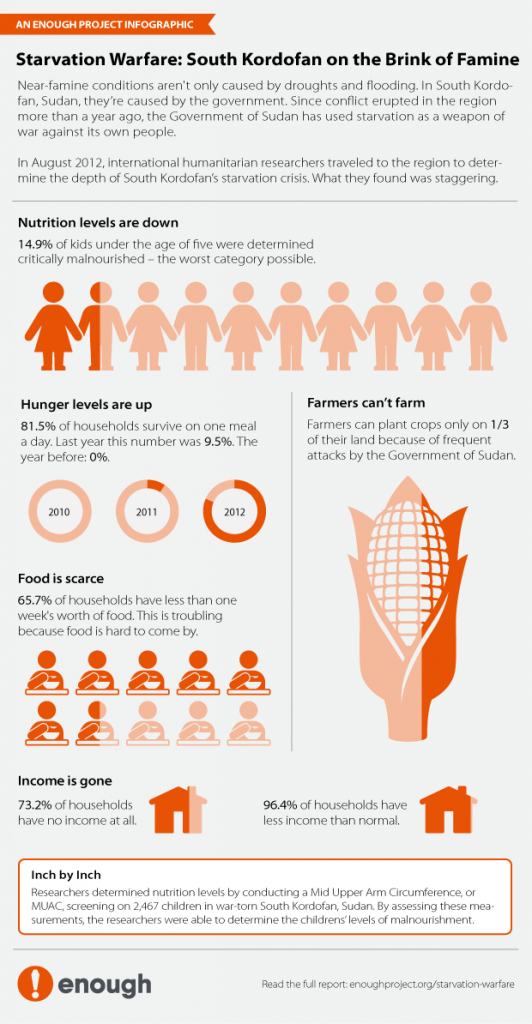As the humanitarian crisis unfolds in Sudan’s South Kordofan and Blue Nile states, international humanitarian organizations have not been able to assess the nutrition and food security situation in these areas… until now. For the first time since 2011—when the government of Sudan banned all international humanitarian aid organizations from operating in the two states—an independent rapid food security and nutrition assessment has been conducted in South Kordofan state.
The findings of the assessment, released by the Enough Project in a report today, are alarming. (See infographic below.)
The assessment was conducted in Sudan People’s Liberation Movement-North, or SPLM-N, controlled areas of South Kordofan state by an international NGO that wishes to remain anonymous for security reasons. However, the organization requested for the Enough Project to produce and distribute the report so its findings can corroborate existing evidence of the deteriorating conditions in the Nuba Mountains brought on by the government of Sudan’s intentional blockade of humanitarian aid and indiscriminate bombardment of civilians. The Enough Project had the assessment vetted by experts at Johns Hopkins Bloomberg School of Public Health who determined its findings to be credible.
The assessment found that the number of households surviving on one meal per day has jumped to a staggering 81.5 percent, compared to only 9.5 percent one year ago, and zero percent two years ago. Further, more than 65 percent of households have less than one week’s worth of food. This is particularly concerning because food is not readily available for purchase in the area; this year’s harvest is low-yielding so will run out quickly; and incomes are scarce or non-existent.
The researchers used a Mid Upper Arm Circumference screening on 2,467 children to determine malnutrition levels according to the global acute malnutrition, or GAM, rate. The assessment found the GAM rate was 14.9 percent, revealing the prevalence of malnutrition among children as “serious” bordering on “critical”—which is the worst World Health Organization malnutrition classification.
Therefore, not only do the findings of this assessment verify suspicions about the severity of conditions on the ground; they should signal red flags to the international community that it is time to take action as hundreds of thousands of people are being starved by their own government. Reacting to the findings, Enough Project Co-founder John Prendergast said:
The assessment’s findings indicate that the situation in South Kordofan today is similar to the conditions leading up to the Horn of Africa famine in 2011. If the international community does not respond to these early warning indicators in South Kordofan, the situation could have devastating consequences for hundreds of thousands of people. Pre-positioning of relief supplies must begin now, and all possible means of delivery need to be explored and, if negotiations over access fail, utilized.
For nearly a year and a half, the government of Sudan has indiscriminately targeted civilians and denied international humanitarian aid access to civilian populations in South Kordofan and Blue Nile states, particularly in areas under control of the SPLM-N. The assessment was conducted in more secure SPLM-N controlled areas, suggesting that conditions closer to the frontline in South Kordofan could be just as severe or worse. No similar assessment has been carried out in Blue Nile state, but the condition of refugees from Blue Nile indicates that the food security situation may be comparable.
Along with the assessment, the Enough Project issued an accompanying policy brief that outlines recommendations for the U.N. Security Council, African Union, and greater international community. The brief calls on the A.U. Peace and Security Council and the U.N. Security Council to demand the government of Sudan and the SPLM-N cooperate with the Tripartite Partners in negotiating unfettered international access into the two states. If negotiated access fails, the brief asserts that alternative channels must be utilized to ensure international humanitarian access into the two states.
The brief also calls for negotiations between the government of Sudan and the SPLM-N for a cessation of hostilities that will allow for the widespread delivery of humanitarian assistance and the return of displaced populations. As for promoting long-term peace and stability, the brief calls on the African Union to facilitate negotiations for a long-term ceasefire agreement and a broad, inclusive political process to address the conflict’s underlying issues of social, political, and economic marginalization.
Read the full report: "Rapid Food Security and Nutrition Assessment: South Kordofan"
Read the Enough Project’s accompanying policy brief: "The Humanitarian Crisis in South Kordofan and Blue Nile: Next Steps for Policy Makers"


